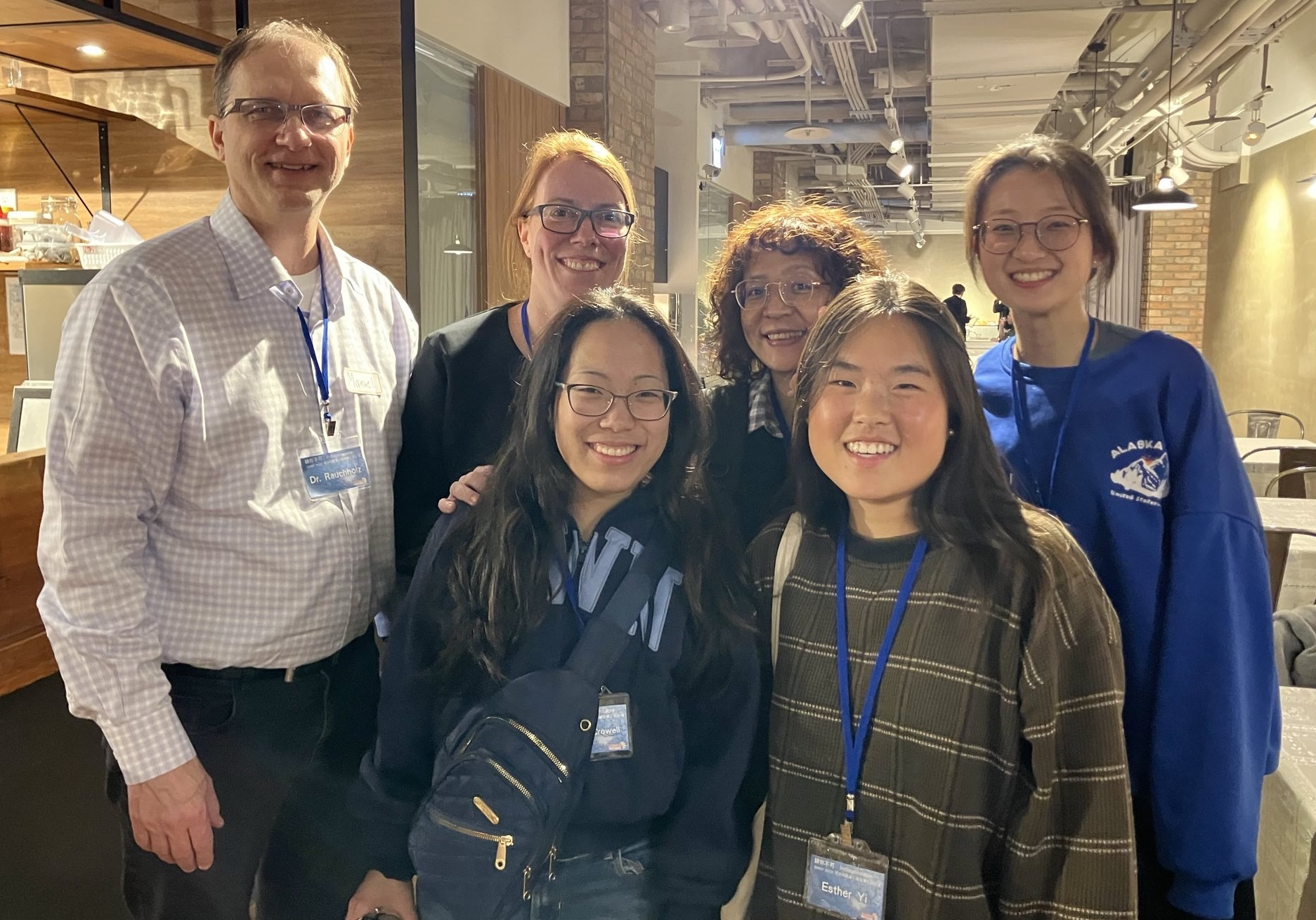
Indispensable: A Disability & Ministry in Asia-Pacific Conference.
Warning: this blog post is super long.
Life-changing. If I could describe the conference in one word, it would be that word. I had an amazing time. So much happened that I hope I can interestingly describe all that occurred without dragging on and on. I will break down each day as a whole and dive deeper into each workshop I attend. However, before I start, I hope and pray that this topic challenges you to think differently like it has caused me.
Friday, March 14th:
I woke up at 3:30 am, an hour early than needed, because I was afraid of sleeping through my alarm again like the last time I had to get up early in the morning.
After getting ready, I was hungry, and decided to make myself toast. We had made a multigrain bread with walnuts the day before in the bakery, and the teacher on the 3rd floor bought a loaf but blessed me with half of it. I was excited to try it, especially since I helped with the process of making it! It was very good, especially with the layer of honey on it. :)
At the Hualien main station, we picked up one of the teachers from Bethesda because she was coming to attend the conference with us, as it was in Mandarin and English.
There were 5 of us attending so I had to sit in the middle seat since I’m the smallest. I don’t mind but was exhausted at the end because I didn’t get any more sleep since that location is awkward. Both Tian and Esther offered to let me lay on their shoulder, but I prefer not to because I feel that would be uncomfortable for them as they also are trying to sleep.
We were scheduled to arrive a bit early, which would be great. However, when the GPS said we had arrived at our location, something was not right. Mirjam double-checked and discovered that she had put in the wrong address and the place we had to be was 55 minutes away.
Thankfully, when we got there, the first session had just started, so we didn’t miss much.
The whole conference was focused on ministering to those interacting with those who have special needs, whether in an organization setting or with those who have special needs kids.
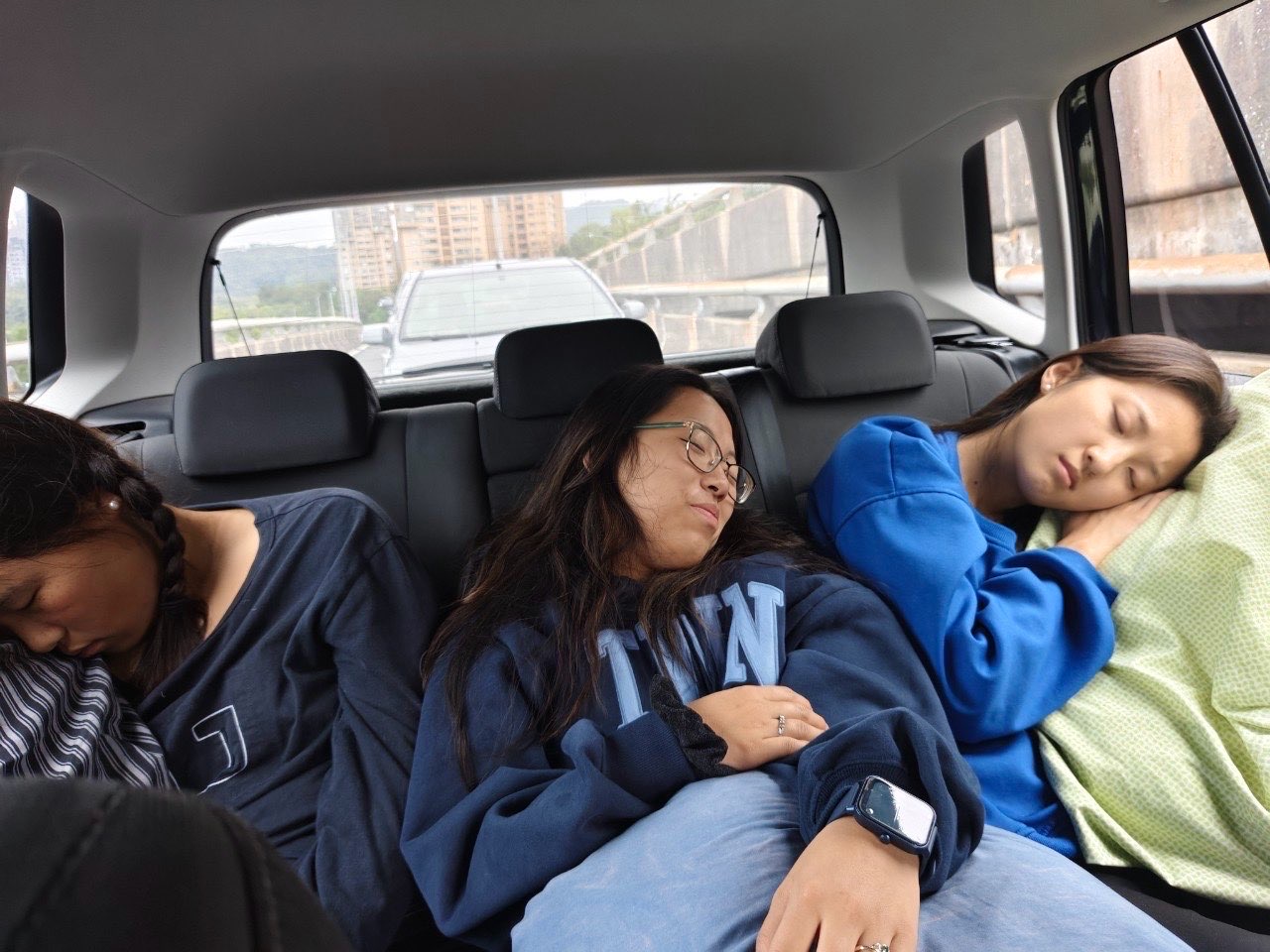
Long drive down to Taipei.
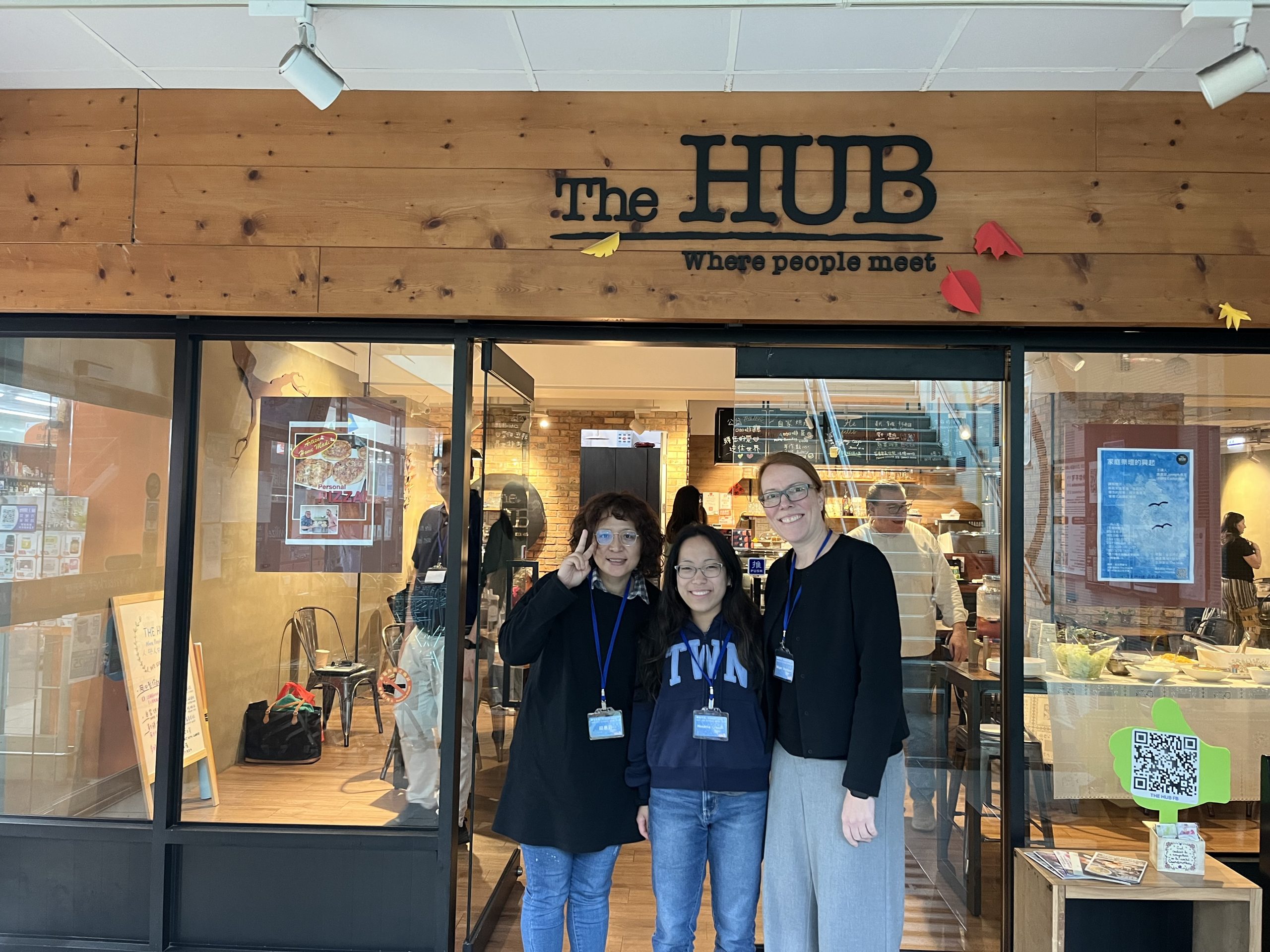
The coffee shop where we had food and fellowship.
General Session: Frameworks of Disability. – MaDonna.
Bio: She and her husband are missionaries in Taiwan. They have a special needs daughter.
Ministry Name: Taiwan Sunshine.
In this session, Madonna went through the history of the people with disabilities and how, through time, the term and culture changed. For example, in biblical times they would assume it was a curse based on the sins of the parents (John 9:1-3), but nowadays, because medicine is so advanced, we can sometimes tell why people end up having disabilities and can diagnose it beforehand.
After this we had a coffee and snack break and went to attend a workshop. There were 2 in English and 1 in Mandarin to choose from.
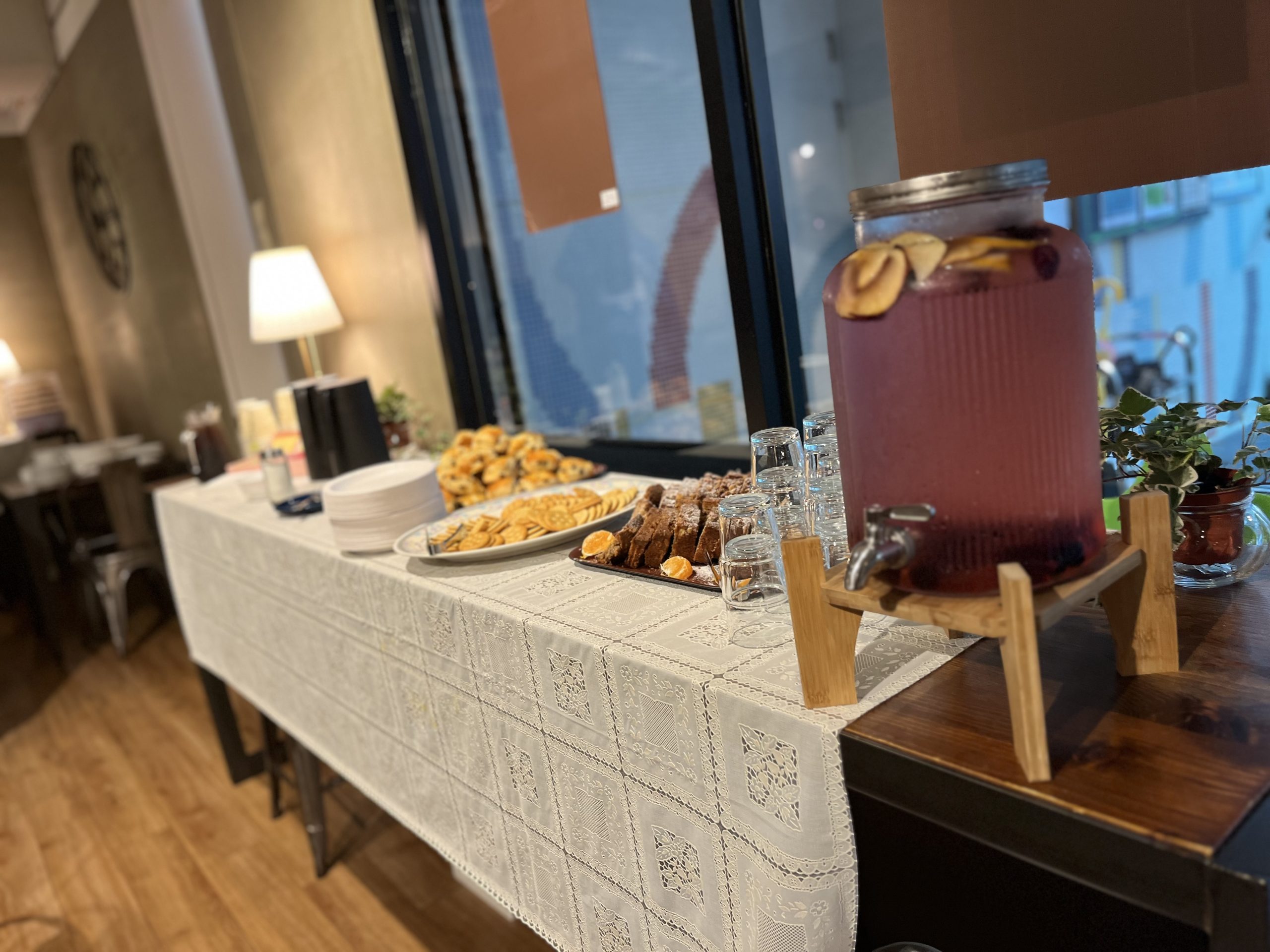
A beautiful display of snacks and drinks.
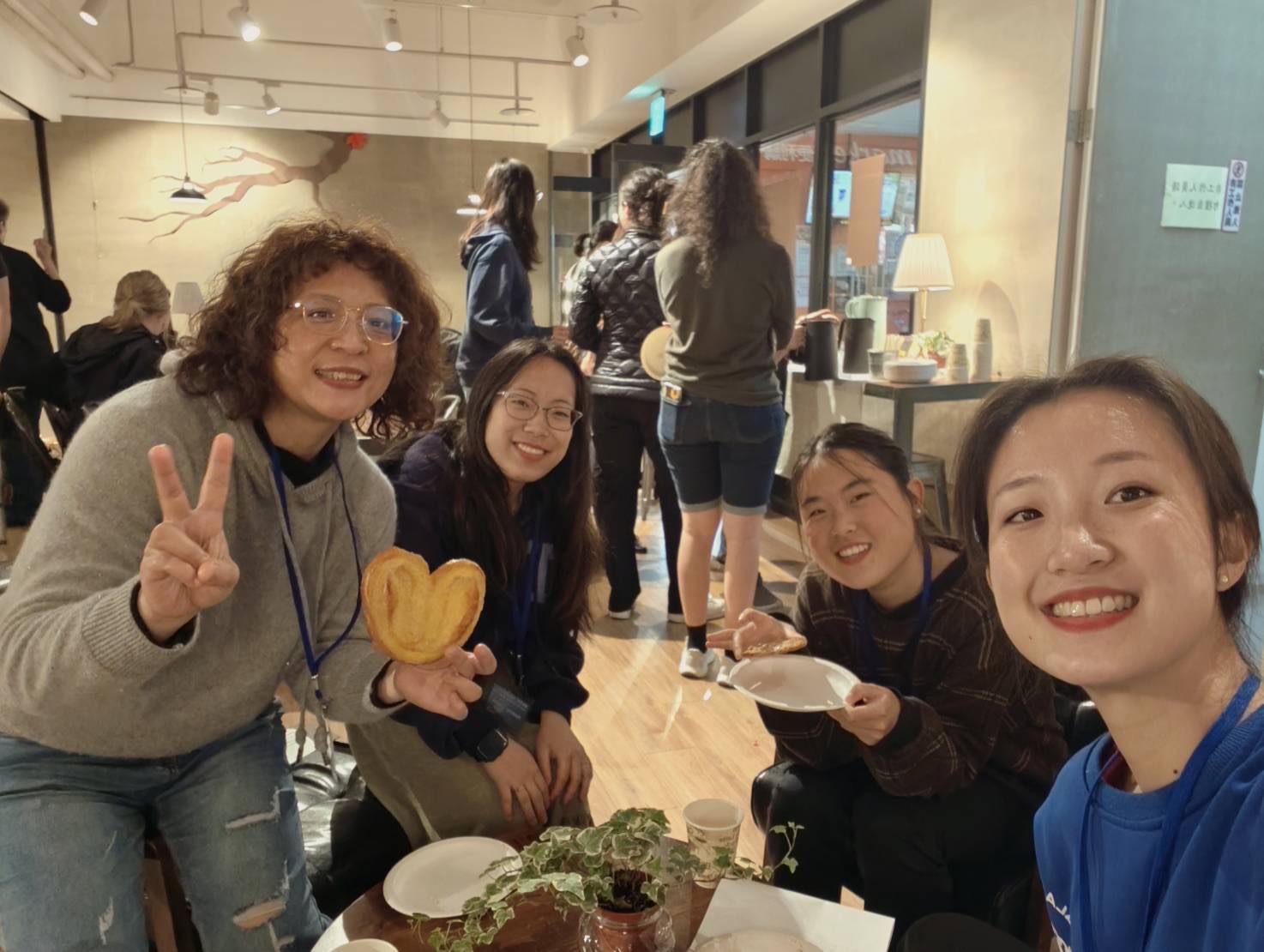
Fellowship time.
Workshop 1: Nutritional and Lifestyle Strategies for Physical, Emotional, and Brain Wellness. – Tim.
Bio: Nutritionist who uses holistic ways to help with anxiety, depression, ADHD, etc…
Ministry Name: Pleroma Coaching.
This session was very good for me. Although I don’t have any of the disabilities he mentioned, the lessons Tim taught on healthy nutrition can apply to me and the function of my body. The main key points I took away were that eating a healthy, nutritious diet can help with mental, physical, and emotional well-being. Some statistics he shared were pretty shocking, such as… the “western diet” affects growth in the womb; a 66% increase ADHD and 122% increase autism. 7% of US adults are healthy, while 93% have cardiometabolic dysfunction. 74% of US adults are obese. But there’s good news: there are things we can do to stay healthy and not be a part of the statistics.
Steps to help your body:
1. Eliminate ultra-processed food as they are calorie-rich but nutrient-poor.
2. Avoid seed oil. Our body does not use them, rather they oxidize the body, which is not good. Plus, to make them eatable, they have to go through this long process with heat and chemicals.
3. Enjoy whole foods and prioritize protein.
4. Only take supplements when necessary. It is much better to get your vitamins naturally.
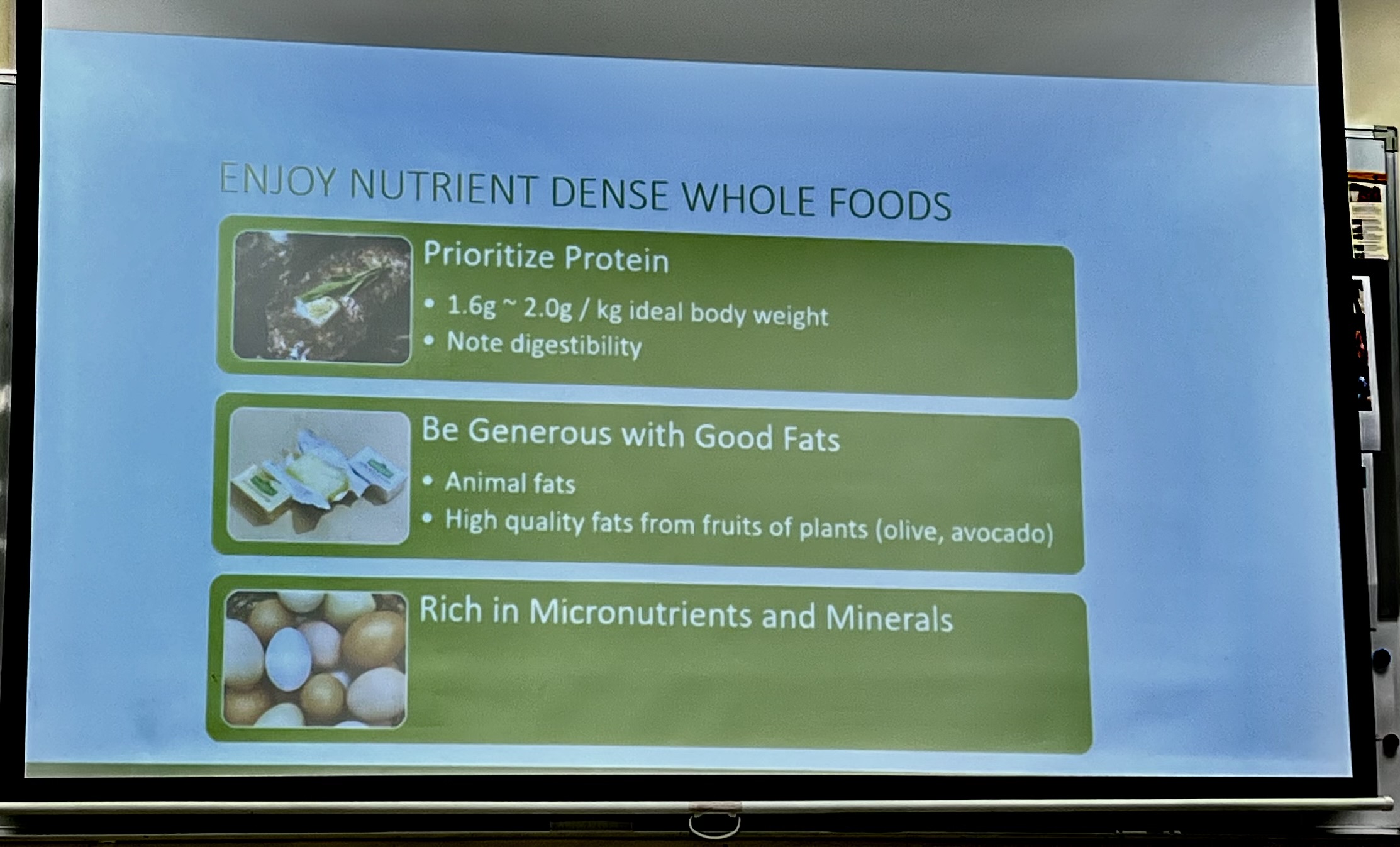
What you should focus on eating.
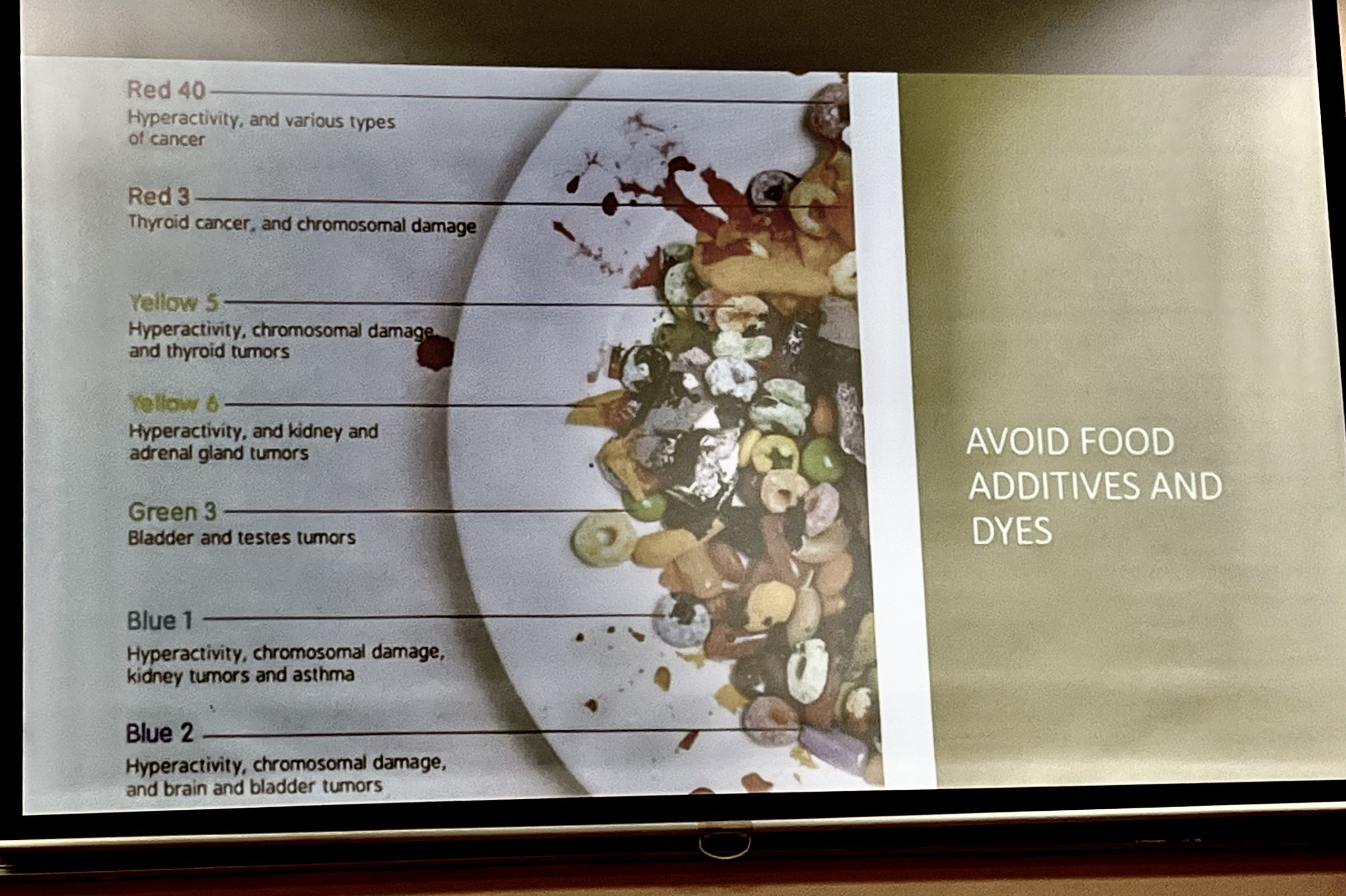
The horrible side effects of eating food with dyes.
Lunch:
We had a wonderful, nutritious meal of Mexican salad bowls. Which was perfect, especially after the workshop focused on nutrition, haha. It has been forever since I’ve eaten a salad of any type. At Bethesda we have a lot of greens, especially cabbage, but they are always boiled and not crunchy.
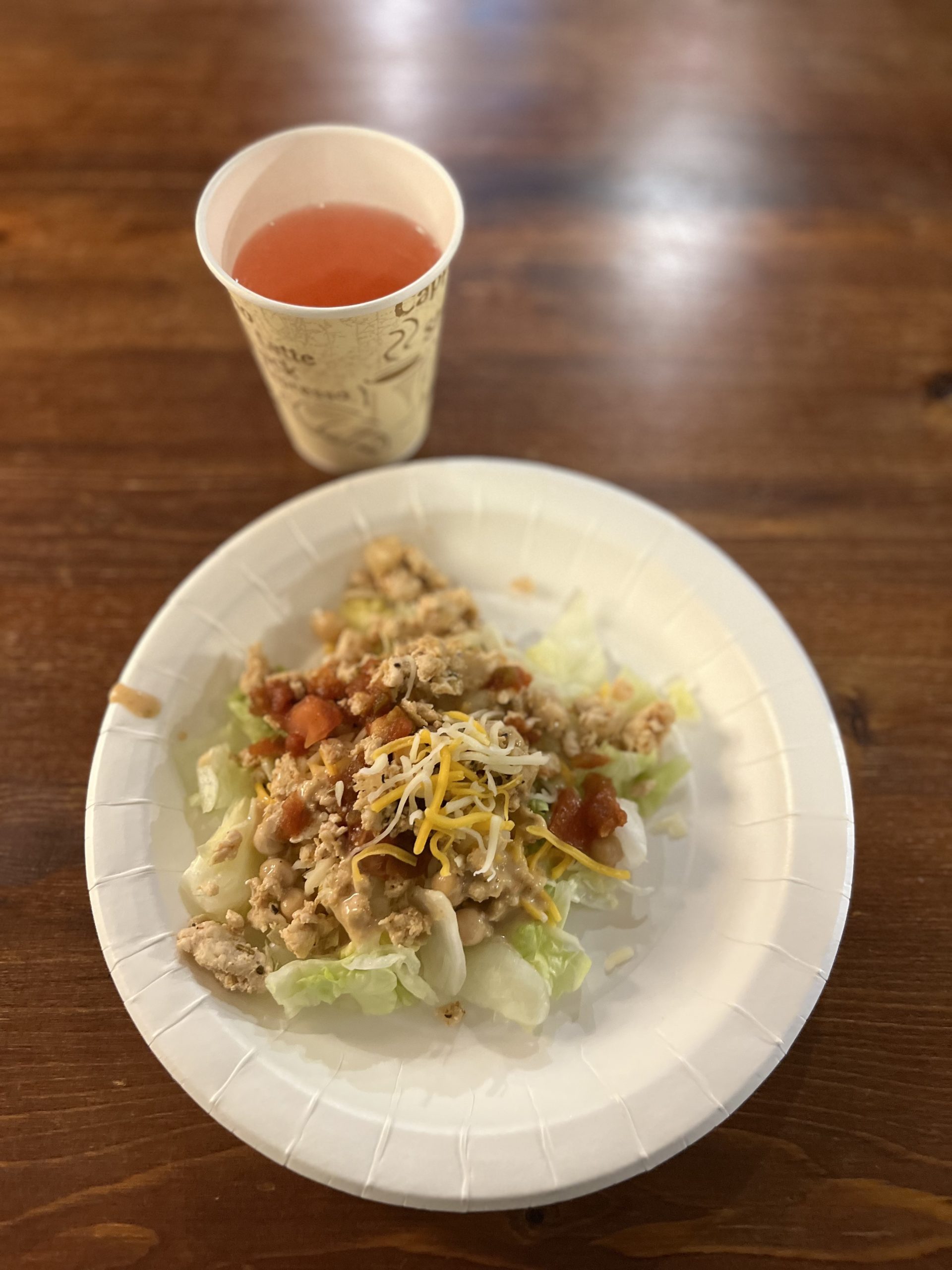
Delicious!
General Session: Exploring the Psychological World of Special Needs Children –Focusing on Developmental Delay, Autism Spectrum, and Hyperactivity. – Tze-Tyng.
Bio: Licensed Counsellor.
Ministry Name: Grace Counselling Centre.
This session was in Mandarin, but through a walkie-talkie type system, I was able to get a translation through an earbud. However, I’m glad I understand quite a bit of Mandarin, as the translation was not so great and was confusing at times, although I did get more out of it than if I didn’t have it. Tze-Tyng talked about engaging with people, mainly kids, who have autism, hyperactivity, and developmental delays.
Workshop 2: Communication 101 & Inclusion Strategies for Children with Autism. – Michelle.
Bio: Speech-language pathologist who helps TCKs (third culture kids) with disabilities and their families.
Ministry Name: NA
Michelle mainly works with missionaries and non-speaking kids and talked about how she communicates/interacts with them and helps them be able to communicate what they want. She prefers to refer to these kids as non-speaking over nonverbal. Being nonverbal means that you can’t communicate at all, not with words or actions, but being nonspeaking means you can still communicate with actions and sometimes words; you just have a harder time and need therapy to help as well as using more creative ways. She also gave us practical tips we can use when interacting with non-speaking kids.
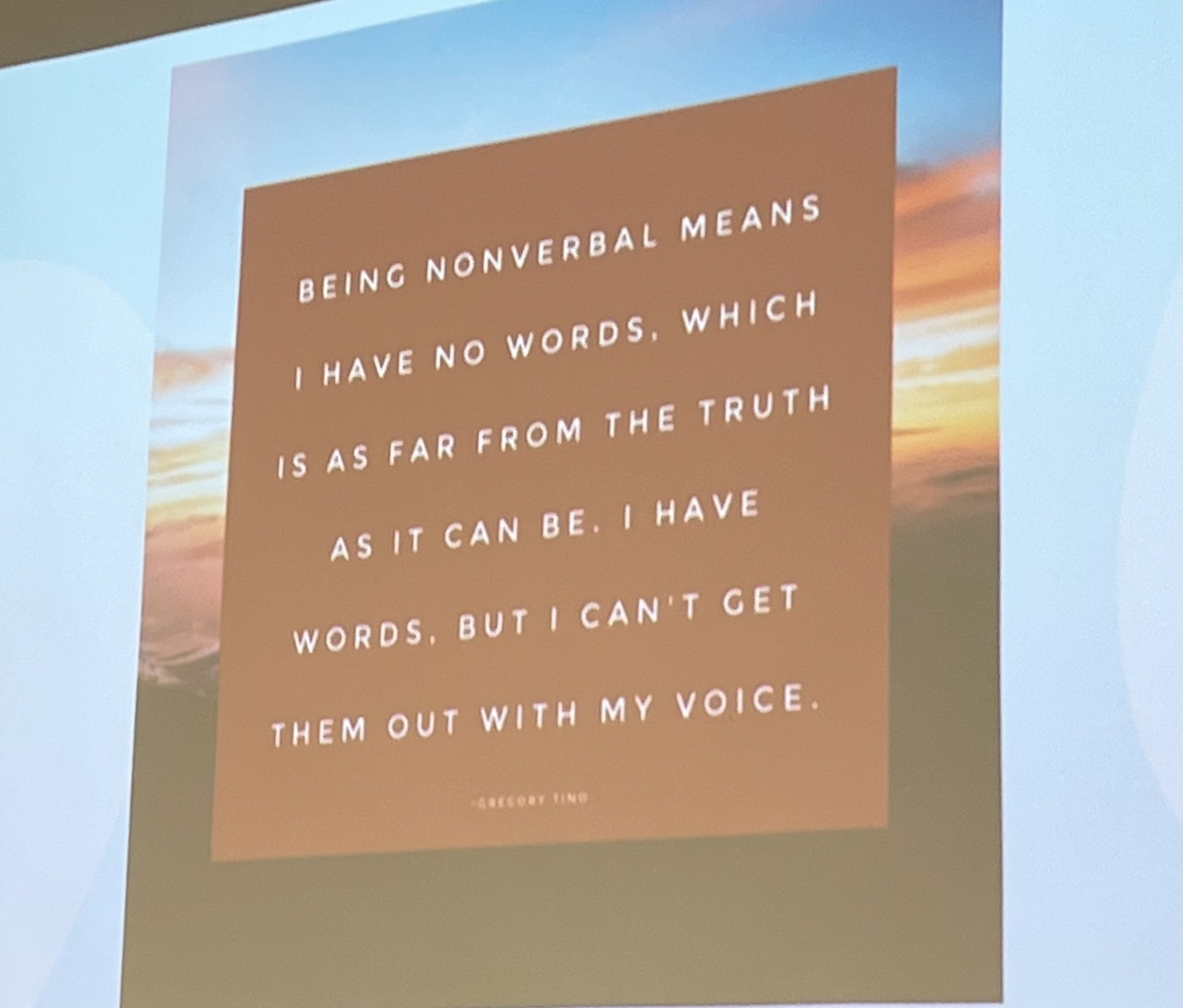
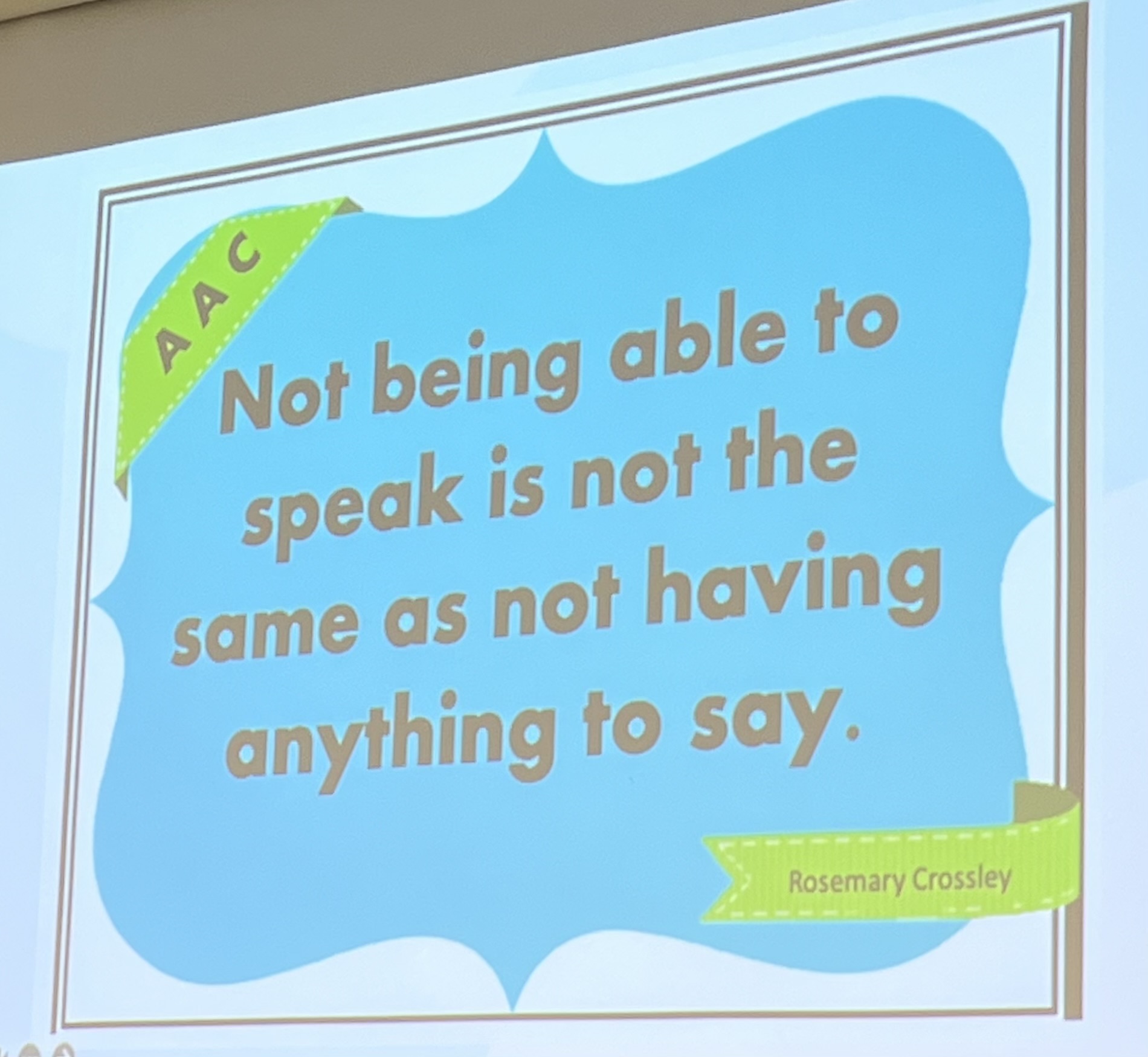
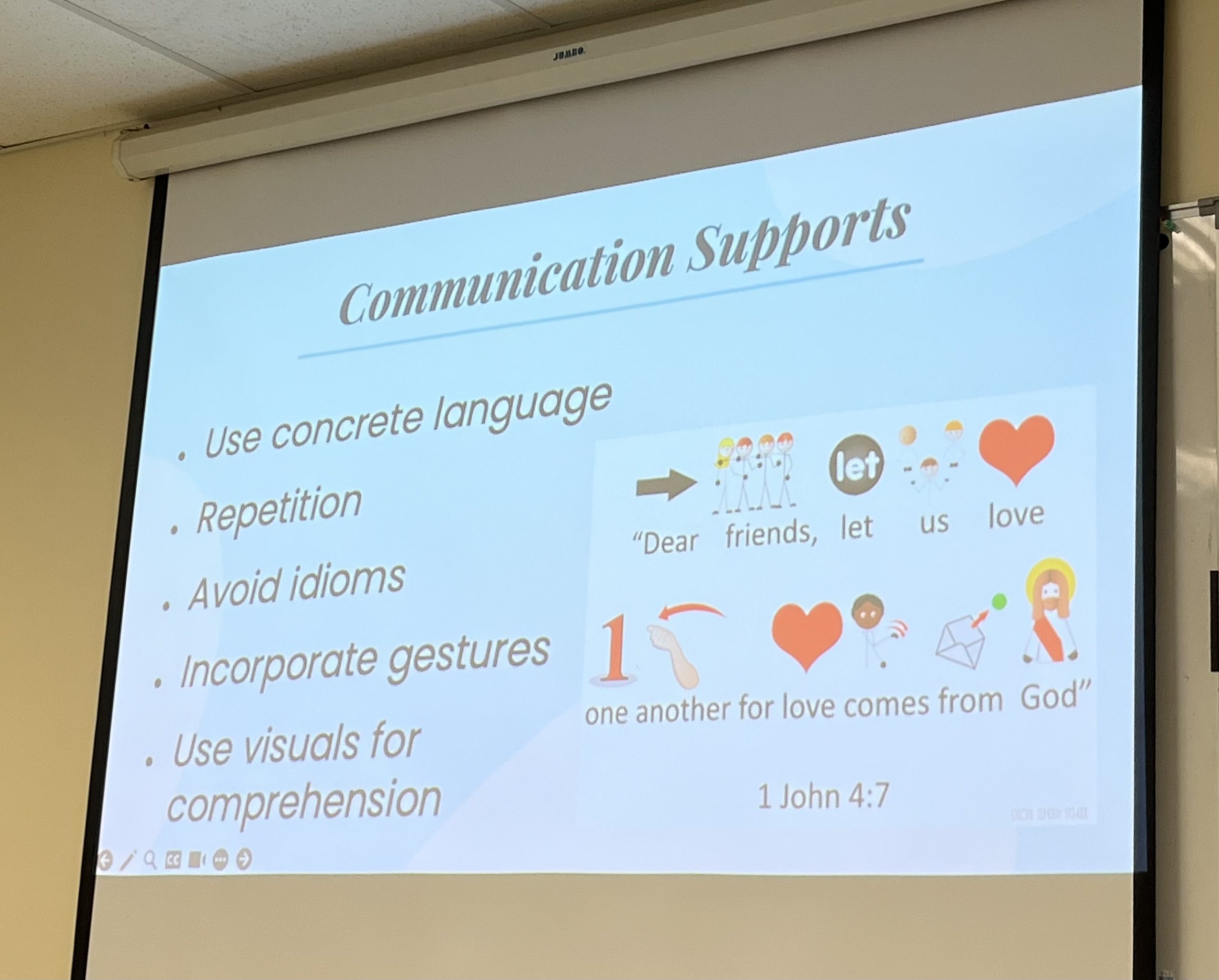
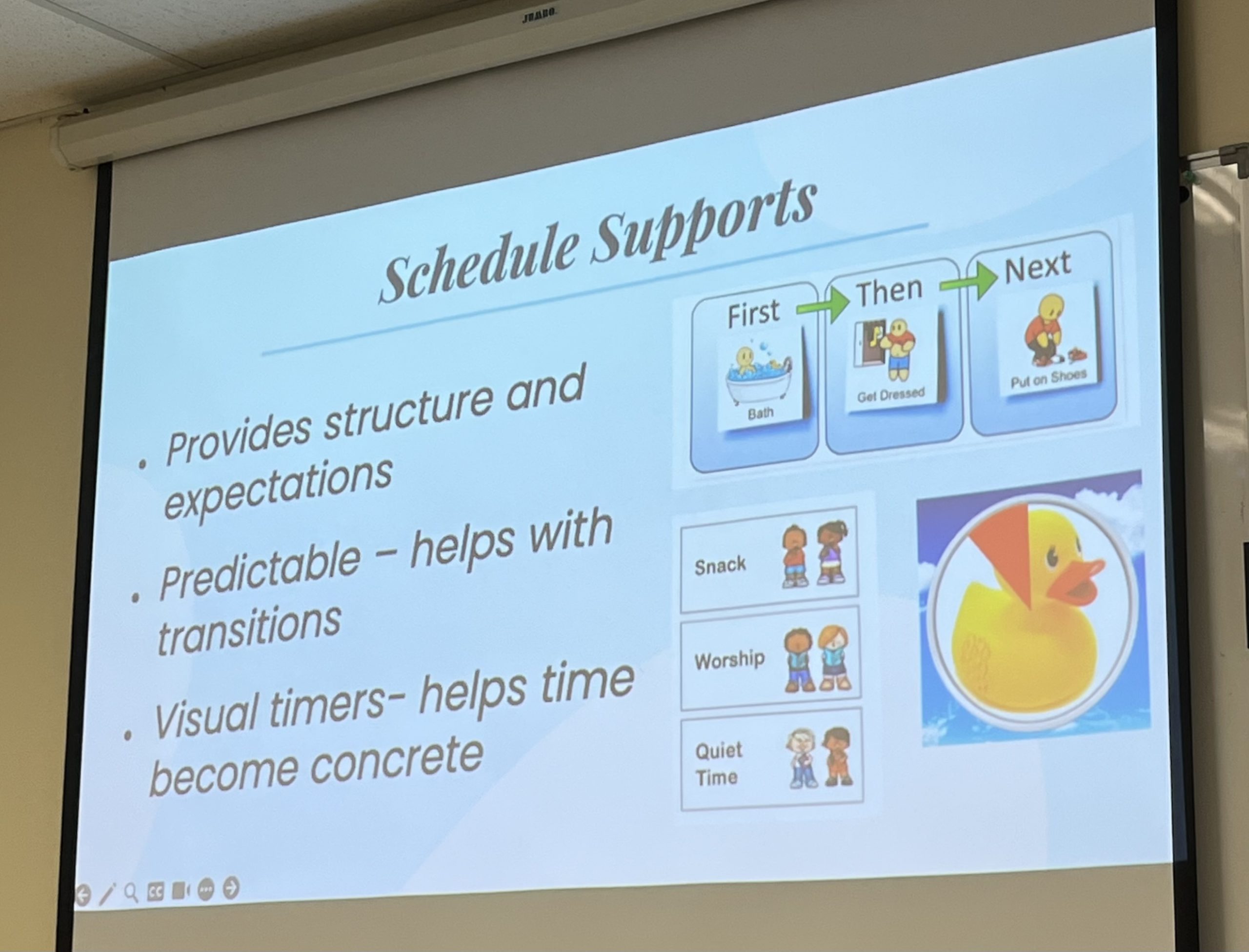
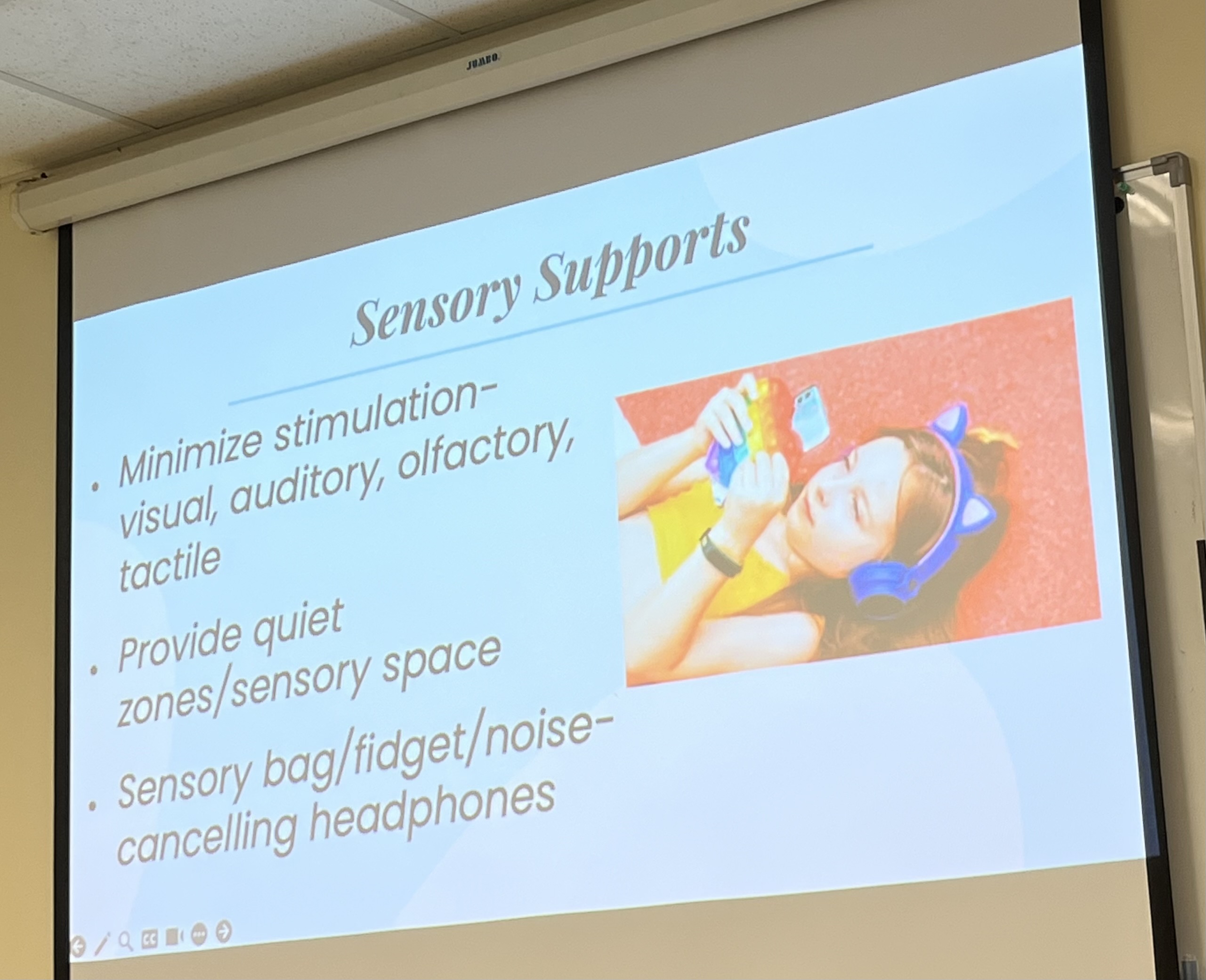
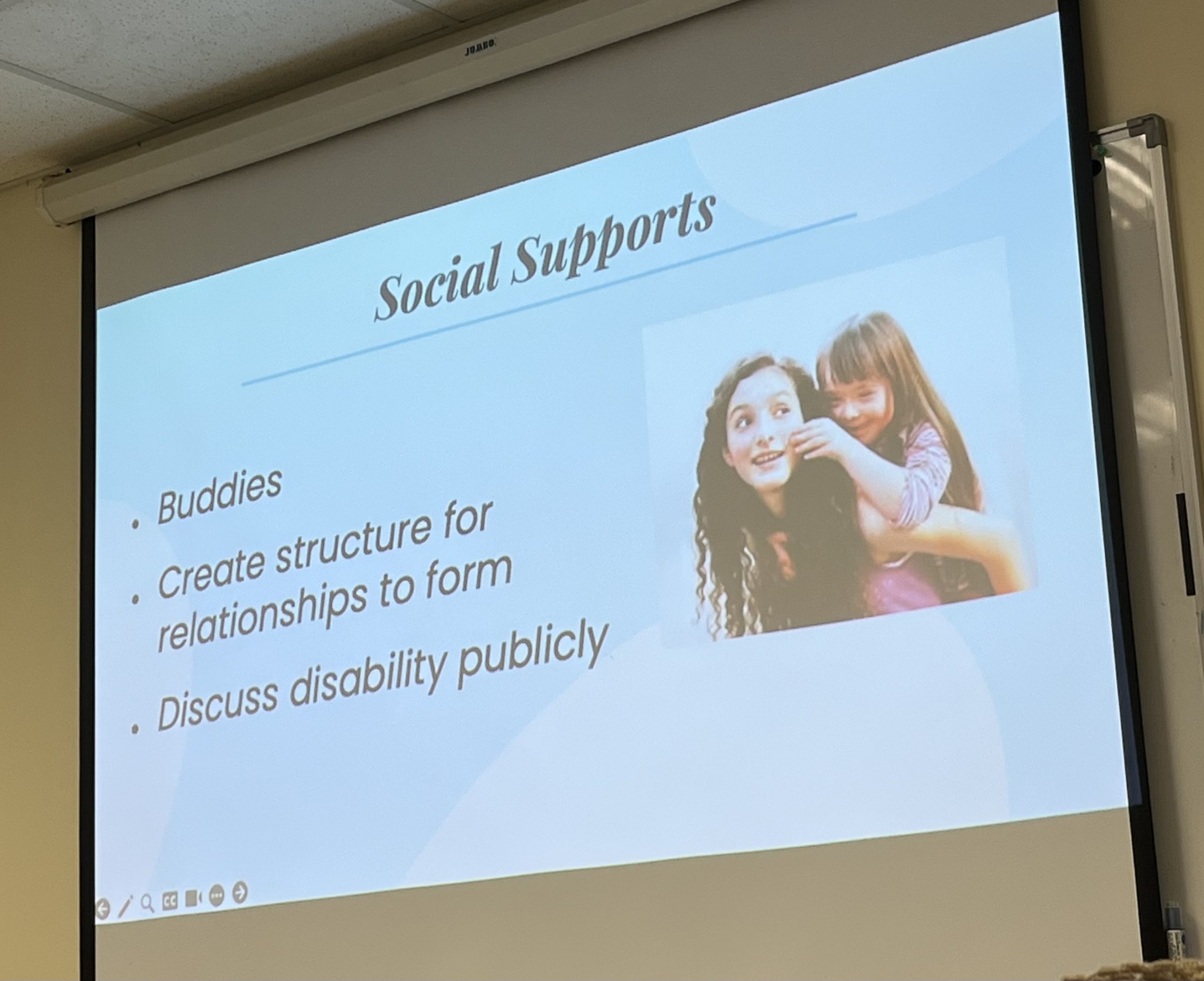
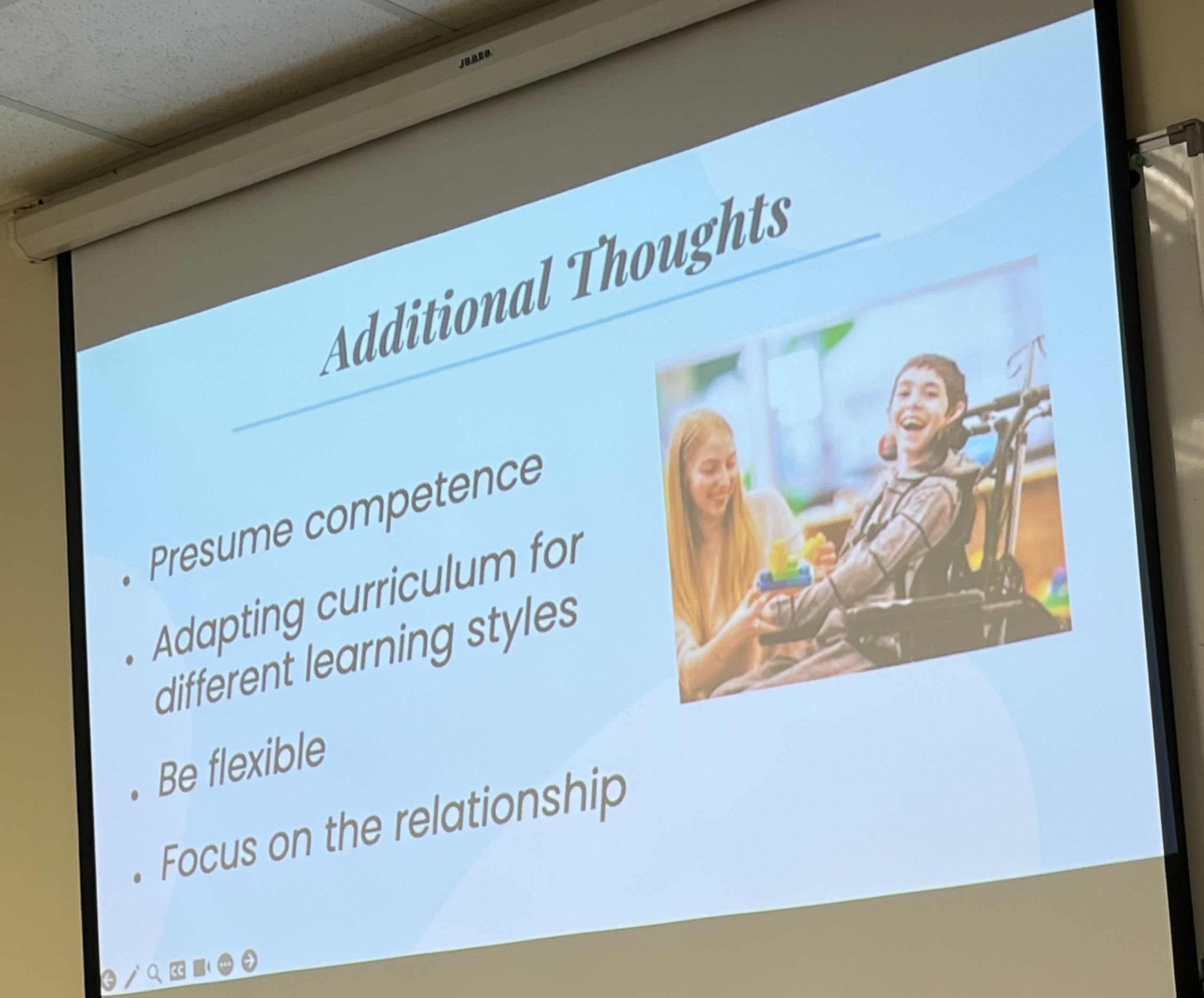
Workshop 3: Supporting Sibs: Tips from a Typical Sibling turned Special Needs Mom. – Jasmine.
Bio: Missionary in Thailand working with wheelchair distributing. Mother of an adopted Down Syndrome child.
Ministry Name(s): Stronger Together & RICD Wheelchair Project.
Jasmine gave us the perspective of a typical sibling with a non-typical sibling. And if anyone knows, she does; she mentioned her family adopted 7 kids on top of their 7 biological children, and many of them had special needs. When you have kids with special needs as well as biological, it is easy to overlook the typical kids, but it is very important that you do not. She sometimes struggled with that in her family, although she believed her parents did a very good job making sure no one was overlooked and everyone was included in special activities.
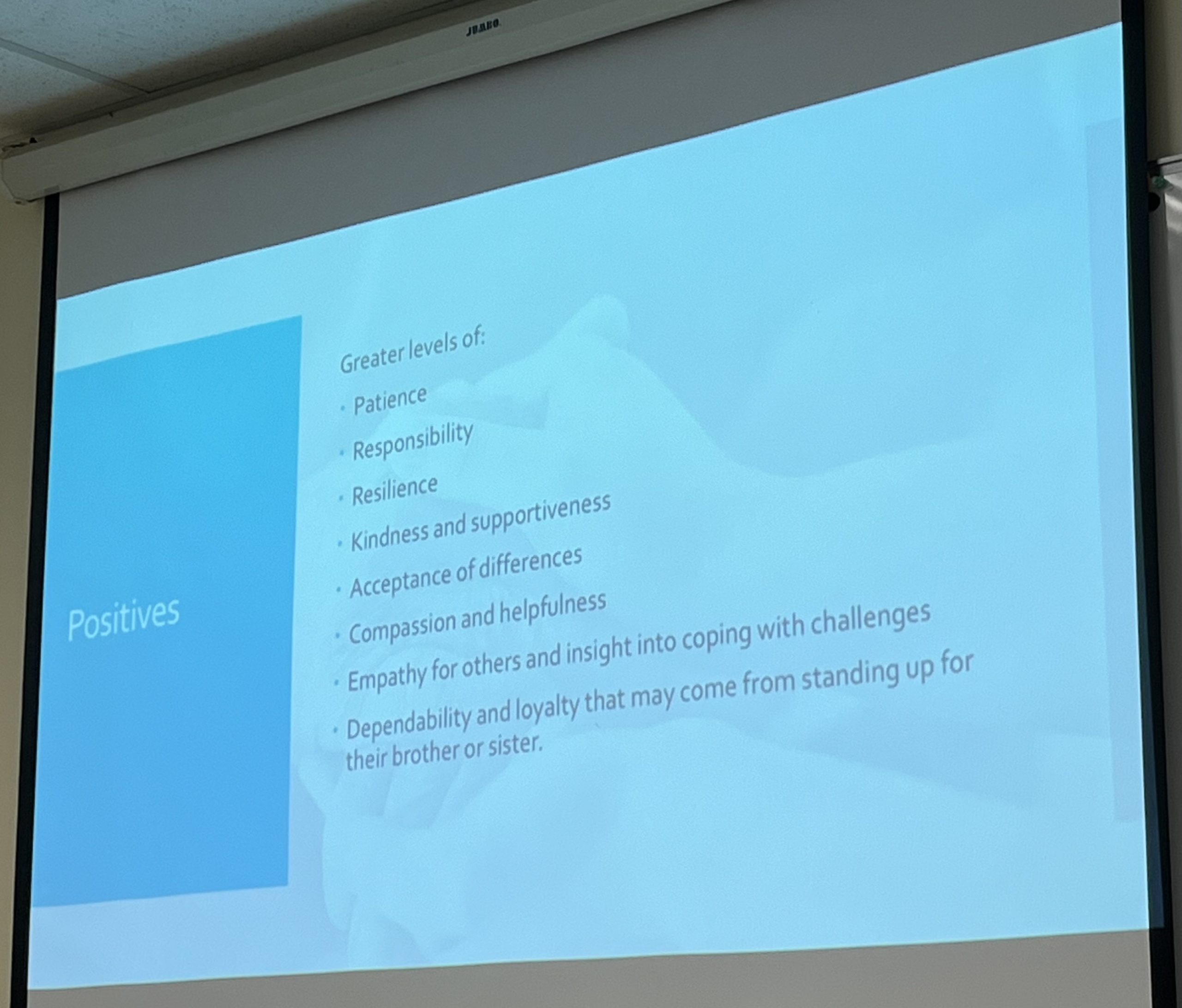
The positive characteristics of growing up with special needs siblings.
Saturday, March 15th:
General session: “Culture, and Foundational Belief Systems.” – Dr. Manuel.
Bio: Professor and Theologian.
Ministry Name: Trinity International University.
Why would missionaries spend so much time, money, and resources to help those who are physically or mentally disabled? It is because God has also chosen the weak and those with disabilities to grow His church. God’s ways are different from our ways, and He uses all different people to accomplish His plan for their good and His glory.
These are the main points I felt were important to remember:
Culture is the system of thought and practice that people use in order to order their lives. Such as religion, kinship, and political and economic systems. We evaluate each other’s behaviour and that of ourselves against these systems of thoughts and norms. Societies may actively limit or confine the roles of certain groups or individuals or prescribe them a disability. In many cultures, physical and cognitive limitation is viewed as deviant from sociable norms and with suspicion, fear, anger, and shame, and contact is therefore avoided. However, there is hope for everyone, no matter what you have, according to the Bible; if you have confessed your sins, repented, and turned to God, He promises that ALL of us will receive a new body in Heaven. Even those who are perfectly healthy need redemption because they are still going to die; their life is not forever, only temporary.

The next three workshops I attended:
Workshop 1: A Coffee Shop in Korea. – Dr. Manuel.
In Korea there is a coffee company called “His Beans’ that trains and gives employment to those with special needs. They have 165 disabled baristas. The government has to pay a lot of money for people with disabilities, so they require companies to employ special needs employees to help out. You can get a fine for not employing special needs employees, and over the past 5 years, private Korean companies have paid 1.2 billion USD.
Workshop 2: Essentials of Coordinated Family Care Models. – Michelle.
Family Care Team helps those with families who have to care for special needs kids. They help the family:
- Identity Needs
- Connect Resources
- Plan/Goals
- Follow Up
- Readjust
In order to have a Family Care Team you need be team focused:
- Share Vision & Information
- Team & Attribution
- Group Guidelines
- Point Person
- Goals
- Monitor & Follow-up
We need to be proactive not reactive.
Tips for Coordinating Care:
- Communication
- Transparency/Self-Awareness
- Confidentiality
- Accountability
- Support System
- Spiritually Vitality
- Journey Companions
- Practical Help
- Mentors
- Training/Education
Workshop 3: Beyond Suffering Training and Disability Ministry. – Tan.
Bio: Worked as a regional manager for Joni and Friends in Thailand and helps with wheelchair distribution.
Ministry Name(s): Stronger Together & Joni and Friends.
Tan talked about how his ministry, Stronger Together, got started and how much of an impact it has had on families with special needs kids, but specifically on those who need wheelchairs. He reminded us that we need to take action to raise awareness among these churches because there is another group of people—those with disabilities—who need the Gospel, and we must reach out to them in our church as well as widows, orphans, missionaries, etc… We want to build a correct understanding about people with disabilities—one that makes it not difficult to engage with or something to be afraid of. We want to provide something practical and beneficial that can support these churches in carrying out ministry effectively.
To end the conference, we spent some time sharing and praying.
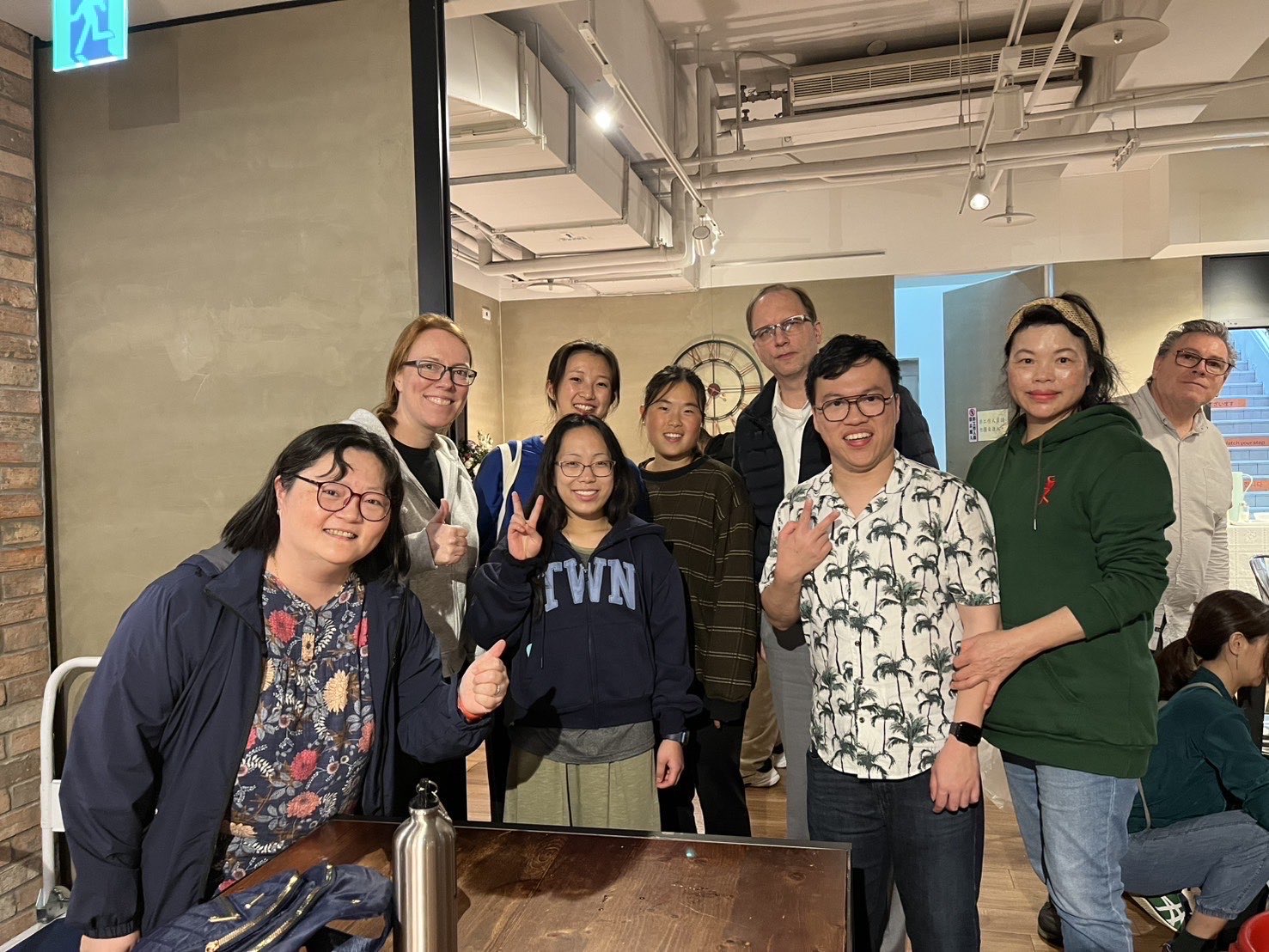
A few of the people we met.
Personal Note:
I’ve already mentioned that this conference encouraged and convicted me. I haven’t really grown up in a community that does much with special needs kids. My parents have had a few friends who have had them, but I never interacted with them much. I remember as a child the few times I was with them I felt uncomfortable. It’s not like I looked down on them or anything, definitely not. I was a pretty shy child and have a hard time initiating conversations and do not like to be touched, let alone hugged. If you know people with, for example, Down Syndrome, you know they love to be touched which was hard for me to get used to.
I have been so happy to learn that many Christian organizations are out there to minister to these people, especially since I am not able to do much right now. I’d encourage you to pray that these needs be met and these ministries would continue to grow. Coming to Bethesda and working with kids with disabilities has done a lot for my own life. I do feel like I’m a new person; stepping out of my comfort zone has been good for me, and since this conference I feel better equipped to engage with people with special needs.
I’ve always had a heart for orphans, especially with my background and all, and have always wanted to adopt. I think now, since this conference, I would be willing in a way I’d never be before to take on that challenge and adopt those with special needs, as many will not. It’ll be hard, but I will trust in the Lord. I have never considered special needs children as much because I always thought it would be too much work. I have now come to realize that they also need love and care just like other people. In my own life, my parents have given up so much of their time, energy, money, etc… to save me from being a dying orphan, adopting me, and lovingly caring for me through my disability that I had for 15 years of my life as well as through the bone marrow transplant. They have greatly inspired me to do the same. I could not imagine what my life would be like without them; more likely than not, I’d be dead, which is not a pleasant thought. In light of that, I just think of all the stories I’ve heard about kids that were orphans or who lived in poverty that became something big because somebody believed in them and gave them a chance. What many people could do and be if we only gave them a chance to show their talents. Let us make that difference, not only in our own lives but in others.
Finally, I want to challenge you with this one last thought that made me stop and think. I have never thought about this before, but once it was presented, it was so powerful. When we think of a commandment for missions, our minds immediately go to Matthew 28:19, which says, “Go, therefore, and make disciples of all the nations, baptizing them in the name of the Father and the Son and the Holy Spirit.” Does anyone think of Luke 14 when Jesus tells about the parable of the guests? To start off, Jesus tells the Pharisees that when they give a dinner, they should not only invite friends, family, and neighbours because if they do, these people are able to return the favour which should not be your reason of being hospitable. Rather, in contrast, Jesus says in the following two verses, “But whenever you give a banquet, invite people who are poor, who have disabilities, who are limping, and people who are blind; and you will be blessed, since they do not have the means to repay you; for you will be repaid at the resurrection of the righteous.” Later in verses He tells the parable of the guests, verses 21 & 23 says, “Go out at once into the streets and lanes of the city and bring in here those who are poor, those with disabilities, those who are blind, and those who are limping… Go out into the roads and the hedges and press upon them to come in so that my house will be filled.” How many times does Jesus tell us to do ministry to specific people? Not only are we to take the gospel to every nation, we are to take it to everyone, and people with disabilities are a part of the command.
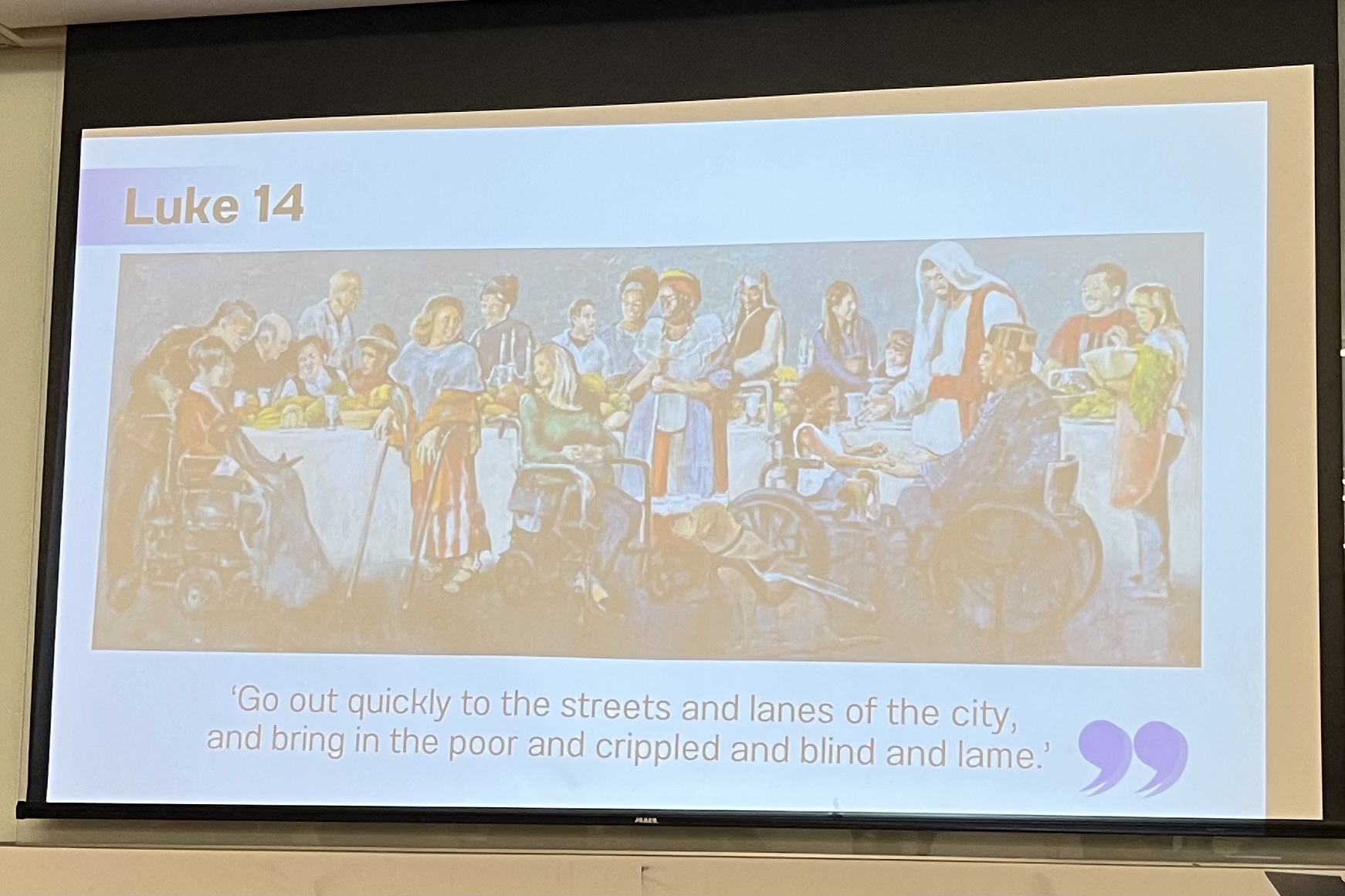
A good reminder.
Well that’s all for now. Apologies for the long post, I had much to say :)
Soli Deo Gloria,
Hosanna



